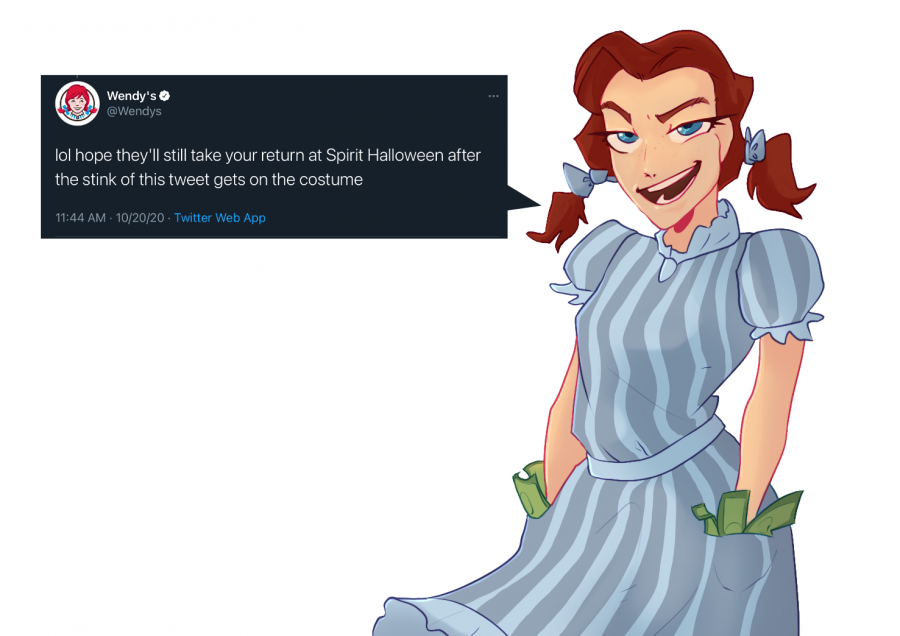Entertainment in Ads
Image depicts an Anime version of Wendy’s mascot, Wendy, along with a screenshot of a tweet posted earlier this month.
In the past few years, there has been a huge influx of corporate companies expanding their brand advertising onto social media, but doing so in unexpected ways. These companies are not relying on professionalism, instead they are trying to be as “relatable” to their consumers as possible.
One of the most notable companies partaking in this new trend is Wendy’s. This fast-food joint has been spotted on countless news sites for being “savage” on their Twitter account.
Wendy’s is not the first or only corporation to do this. In fact, there have been many companies that have taken the same path such as Burger King, Arby’s, Oreo, and McDonald’s.
All of these accounts have used things such as slang from stan Twitter, memes about their food, and pop culture references.
However, on Tumblr back in 2013, the American breakfast chain, Denny’s, was the first company to start the “relatable” trend.
Denny’s first got attention when they, “hired 23-year old Amber Gordon, to oversee all their social media accounts…Gordon focused on expanding Denny’s presence on Tumblr, launching an official account on April 9th, 2013. By July, it had…been praised for the way it advertises by engaging in meme culture without sounding out-of-touch” (https://knowyourmeme.com/memes/subcultures/dennys).
Corporate companies have since created their own personalities to put on to their own social media, especially making their presence on Twitter.
For example, Burger King used to post generic Tweets, usually promoting sales or events at their restaurants. But now, almost their entire Twitter timeline has become full of memes and pop culture references.
There are now so many companies using this new way of marketing to advertise their own business. However, Wendy’s is undeniably the most infamous for this, having almost 4 million followers on Twitter.
So…why Wendy’s?
With this less professional form of advertising becoming increasingly popular, the Wendy’s mascot started to have a new identity, as people gave her the persona of an anime girl with a smart mouth.
At first, this didn’t seem to be a big deal; it was just a company attempting a different form of advertisement. But with the way these companies interact with people on the platform, they start to change what people think of them.
With the company having their mascot, Wendy, using trendy slang terms and acting “relatable” to their followers, people stop thinking of Wendy as a company, they start thinking of her as a person herself. By portraying a person instead of a company online, this gives the company a new form of identity. Now, when people think of Wendy’s they don’t think of the massive fast-food company. The company has thousands of employees, and using their social media interns to make these Tweets, it allows consumers to think of Wendy as their fun and snarky friend.
While this might not appear as a problem at first, there is always something lying beneath the surface to see if someone thinks deeper.
When Wendy makes a sassy comment to someone on Twitter, that is advertising. Traditional advertising is usually when they promote sales or exclusive deals; however, by keeping the company name attached, it is still an ad.
If someone thinks of that funny meme that Wendy posted earlier that day, it gives them a positive association with the company, slowly building up the company’s reputation in a person’s own head.
This form of advertising is not something that people are used to. Thus, the line between entertainment and ads begin to blur.
With people now associating Wendy as an individual person, it is suddenly the “trend” to support this company instead. If people call Wendy out on this form of advertising, and Wendy replies to them with a snarky remark, suddenly the internet supports her side.
Now, people are not going to solely think of Wendy and see her as their fun anime friend, that just isn’t rational. Obviously she isn’t a real person, however, on a subconscious level, their thoughts of Wendy slowly and positively grow overtime from seeing her be entertaining over social media. They would have grown positive feelings for the brand by not even realizing it.
While it is funny to watch companies roast one another on Twitter, it gets harder to draw the line between a well-established company and a person. So, the next time someone gets food at Wendy’s, they should question what could have inspired them to want to eat there in the first place.










